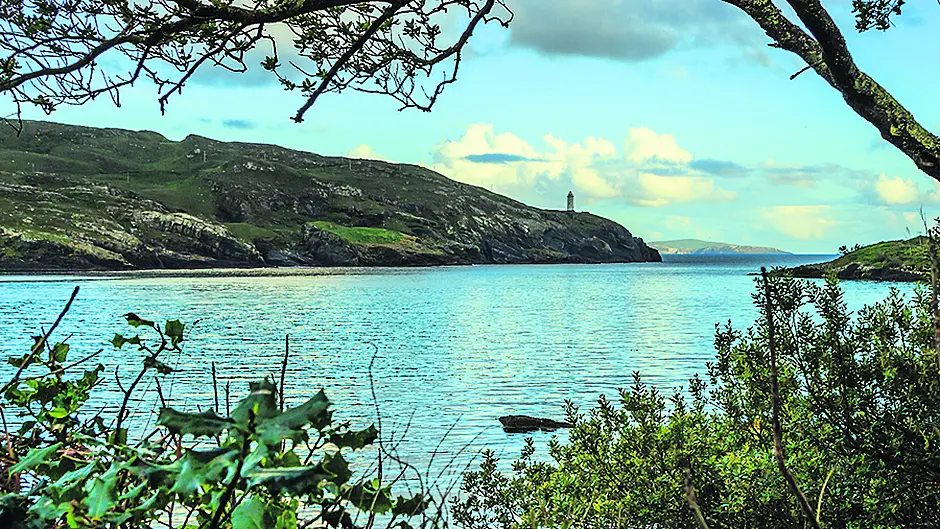Cruel and ecologically damaging gill nets should be banned, and community-managed protection marine zones need to be established in Beara, a regular visitor to West Cork has suggested
A KEEN angler, who has been visiting Beara for almost 20 years, has said that unless something is done to stem the scourge of gill netting, angling tourism on the peninsula will die within a few years.
Wicklow-based angler Ashley Hayden, who comes from several generations of fishermen, discovered the beauty of the West Cork peninsula in the early 2000s, along with a friend who had been coming a few years earlier.
They found several species of fish abundant on the pretty peninsula, during their shore-fishing trips, at least once a year. But, in 2014, they noticed the start of a dramatic fall in fish sizes, and numbers.
He puts this down to the use of gill (monofilament) nets which capture large amounts of fish in areas close to the shore, which would have traditionally been fished by local or visiting leisure fishermen.
He says that he has witnessed a 500m-long net being put in the water close to a location which in previous years yielded large amounts of several species of fish.
‘This – a legal practice – did not occur in this area to the scale that we witnessed before 2014. It first took out the vast resident mullet shoals and is now having a right go at the pollack, flatfish and whatever else swims into their indiscriminate invisible plastic meshes. To cap it all, the boat was targeting prime wrasse to be used as pot bait, what an ignominious end for a wonderful sport fish,’ he wrote in a blog on his website recently, entitled Paradise Lost.
Since his blog, and letters published in several papers, Ashley says he has had several people approaching him with similar stories of Beara.
While the gill nets are not illegal, they are being banned, or abandoned, in many other jurisdictions in favour of more eco-friendly methods of fishing. ‘These monofilament nets are basically invisible in the water and they don’t biodegrade. So, if they are lost in a storm, they sit at the bottom of the sea and continue to trap fish. When they eventually break down, they are adding to the microplastics in the sea. Yet, in Ireland, there is nothing illegal about them.’
The angler says he has seen other areas around our coast and on our waterways suffering huge decreases in fish numbers and sizes, and that we need to start protecting areas like Beara before it’s too late.
Areas like Lanlash Bay in Scotland have introduced marine protection zones, and in Quebec, anglers have to abide by bag limits, slot sizes and can only use single barbless hooks to aid a ‘catch and release’ policy. Ashley, who says he is not against commercial fishermen, believes the Irish system is policing the problem of over-fishing with a Victorian attitude, which suggests the sea is a ‘bottomless pit’ of fish, while the reality is very far from that.
He says Ireland needs to take three steps to protect angling tourism: ban monofilament gill and tangle nets; ban the targeting of ballan wrasse for pot bait (encourage use of carcasses and fish heads from fish processing plants instead) and create community-managed marine protected zones.
‘For years we had respected this place, catch and release, an odd fish for the pot, our angling was a conduit, a way to connect with nature and give something back in return, the stories of basking sharks, dolphins playing tag, gannets diving, the sea alive with flashing fish, the few bob left in various local businesses …’ he wrote in his blog, adding that on one day – Tuesday 22nd June 2019 –‘modern life caught up with paradise and chewed it up’ as he watched a boat cast a 500m gill net, thereby trapping a huge amount of fish in one swift action.
In a statement to The Southern Star, Inland Fisheries Ireland said it would be supportive of appropriate legislation to ensure the sustainability of inshore areas. ‘In 2015, our National Strategy for Angling Development included a measure which seeks to ‘designate nursery areas/no keep areas in inshore areas’. These would be agreed areas where commercial fishing was prohibited in order to ensure that juvenile and breeding fish were left unharvested to allow a strong inshore stock of fish within angling distance from the shore.’
It added: ‘These areas would be catch and release for anglers. Inland Fisheries Ireland also recommends that pair trawling close to the inshore areas should be prohibited.’
Meanwhile, the Department of the Marine said: ‘The South West RIFF (Regional Inshore Fisheries Forum) takes in the Beara region and would be the ideal platform to develop and consult with the wider inshore community on proposals such as those suggested ...’
It also pointed out that new laws banning the trawling of inshore waters by trawlers over 18m long will come into effect on January 1st next.
The Minister also recently launched a public consultation on the draft ‘Agriculture, Forest and Seafood Climate Change Sectoral Adaptation Plan’ and the seafood background paper identifies a number of issues arising from climate change, including the observed changes in distributions of certain species of fish stocks and projected wider ecosystem changes. Submissions are invited on the draft plan until Friday August 16th 2019.
----
Bandon Co-Op is delighted to be involved with and supporting many local community groups all over West Cork. This video encapsulates some of the wonderful people that we have the pleasure of dealing with #TogetherStrongerWestCork








